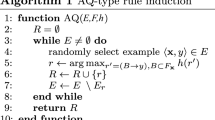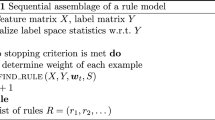Abstract
Learning classifier systems, their parameterisation, and their rule discovery systems have often been evaluated by measuring classification accuracy on small Boolean functions. We demonstrate that by restricting the rule set to the initial random population high classification accuracy can still be achieved, and that relatively small functions require few rules. We argue this demonstrates that high classification accuracy on small functions is not evidence of effective rule discovery. However, we argue that small functions can nonetheless be used to evaluate rule discovery when a certain more powerful type of metric is used.
Access this chapter
Tax calculation will be finalised at checkout
Purchases are for personal use only
Preview
Unable to display preview. Download preview PDF.
Similar content being viewed by others
References
Albus, J.S.: A new approach to manipulator control: the cerebellar model articulation controller (CMAC). Journal of dynamic systems, measurement and control 97(3) (1975)
Anderson, C.W.: Learning and Problem solving with multilayer connectionist systems. PhD thesis, University of Massachussetts, Amherst, MA, USA (1986)
Barry, A.: XCS Performance and Population Structure within Multiple-Step Environments. PhD thesis, Queens University Belfast (2000)
Barto, G., Anandan, P., Anderson, C.W.: Cooperativity in networks of pattern recognizing stochastic learning automata. In: Proceedings of the Fourth Yale Workshop on Applications of Adaptive Systems Theory, pp. 85–90 (1985)
Bonelli, P., Parodi, A., Sen, S., Wilson, S.: NEWBOOLE: A Fast GBML System. In: International Conference on Machine Learning, San Mateo, California, pp. 153–159. Morgan Kaufmann, San Francisco (1990)
Booker, L.B.: Triggered rule discovery in classifier systems. In: Schaffer, D. (ed.) Proc. 3rd International Conference on Genetic Algorithms (ICGA- 1989), George Mason University, June 1989, pp. 265–274. Morgan Kaufmann, San Francisco (1989)
Butz, M., Kovacs, T., Lanzi, P.L., Wilson, S.W.: Toward a theory of generalization and learning in xcs. To appear in the IEEE Transactions on Evolutionary Computation (2004)
Butz, M.V., Goldberg, D.E., Stolzmann, W.: Investigating Generalization in the Anticipatory Classifier System. In: Deb, K., Rudolph, G., Lutton, E., Merelo, J.J., Schoenauer, M., Schwefel, H.-P., Yao, X. (eds.) PPSN 2000. LNCS, vol. 1917, Springer, Heidelberg (2000) Also technical report 2000014 of the Illinois Genetic Algorithms Laboratory
Cribbs III, H.B., Smith, R.E.: What Can I do with a Learning Classifier System? In: Karr, C., Freeman, L.M. (eds.) Industrial Applications of Genetic Algorithms, pp. 299–320. CRC Press, Boca Raton (1998)
de Boer, B.: Classifier Systems: a useful approach to machine learning? Master’s thesis, Leiden University (1994)
De Jong, K.A., Spears, W.M.: Learning Concept Classification Rules Using Genetic Algorithms. In: Proceedings of the International Joint Conference on Artificial Intelligence, Sidney, Australia, pp. 651–656 (1991)
Dixon, P.W., Corne, D.W., Oates, M.J.: A preliminary investigation of modified XCS as a generic data mining tool. In: Lanzi, P.L., Stolzmann, W., Wilson, S.W. (eds.) IWLCS 2001. LNCS (LNAI), vol. 2321, pp. 133–150. Springer, Heidelberg (2002)
Goldberg, D.E.: Genetic Algorithms in Search, Optimization, and Machine Learning. Addison-Wesley, Reading (1989)
Greene, D., Smith, S.: COGIN: Symbolic induction using genetic algorithms. In: Proceedings 10th National Conference on Artificial Intelligence, pp. 111–116. Morgan Kaufmann, San Francisco (1992)
Greene, D., Smith, S.: Using Coverage as a Model Building Constraint in Learning Classifier Systems. Evolutionary Computation 2(1), 67–91 (1994)
Holmes, J.H.: Evolution-Assisted Discovery of Sentinel Features in Epidemiologic Surveillance. PhD thesis, Drexel University (1996)
Jacobs, R.A.: Increased rates of convergence through learning rate adaptation. Neural Networks 1, 295–307 (1988)
Kovacs, T.: Evolving Optimal Populations with XCS Classifier Systems. Master’s thesis, University of Birmingham (1996)
Kovacs, T.: XCS Classifier System Reliably Evolves Accurate, Complete, and Minimal Representations for Boolean Functions. In: Roy, Chawdhry, Pant (eds.) Soft Computing in Engineering Design and Manufacturing, pp. 59–68. Springer, London (1997)
Kovacs, T.: Deletion schemes for classifier systems. In: Banzhaf, W., Daida, J., Eiben, A.E., Garzon, M.H., Honavar, V., Jakiela, M., Smith, R.E. (eds.) GECCO-1999: Proceedings of the Genetic and Evolutionary Computation Conference, pp. 329–336. Morgan Kaufmann, San Francisco (1999)
Kovacs, T.: What should a classifier system learn? In: Proc. of the 2001 Congress on Evolutionary Computation (CEC 2001), pp. 775–782. IEEE Press, Los Alamitos (2001)
Kovacs, T.: Strength or Accuracy: Credit Assignment in Learning Classifier Systems. Springer, Heidelberg (2004)
Kovacs, T., Kerber, M.: What makes a problem hard for XCS? In: Lanzi, P.L., Stolzmann, W., Wilson, S.W. (eds.) IWLCS 2000. LNCS (LNAI), vol. 1996, pp. 80–99. Springer, Heidelberg (2001)
Li, M., Vitányi, P.: An Introduction to Kolmogorov Complexity and Its Applications. Springer, Heidelberg (1997)
Liepins, G.E., Wang, L.A.: Classifier System Learning of Boolean Concepts. In: Belew, R.K., Booker, L.B. (eds.) Proceedings of the Fourth International Conference on Genetic Algorithms (ICGA-1991), San Mateo, CA, pp. 318–323. Morgan Kaufmann Publishers, San Francisco (1991)
Merz, C., Murphy, P.M.: UCI Repository of Machine Learning Databases, http://www.ics.uci.edu/~mlearn/MLRepository.html University of California, Department of Information and Computer Science, Irvine (1997)
Mitchell, T.M.: Machine Learning. McGraw–Hill, New York (1997)
Oblow, E.M.: Implementing Valiant’s Learnability Theory using Random Sets. Technical Report ORNL/TM-11512R, Oak Ridge National Laboratory (1990)
Pagallo, G., Haussler, D.: Boolean feature discovery in empirical learning. Machine Learning 5(1), 71–100 (1990)
Quinlan, J.R.: An empirical comparison of genetic and decision-tree classifiers. In: Proc. of the Fifth Int. Machine Learning Conference, pp. 135–141 (1988)
Saxon, S., Barry, A.M.: XCS and the Monk’s Problems. In: Lanzi, P.L., Stolzmann, W., Wilson, S.W. (eds.) IWLCS 1999. LNCS (LNAI), vol. 1813, pp. 223–242. Springer, Heidelberg (2000)
Schaffer, C.: A conservation law for generalization performance. In: Hirsh, H., Cohen, W.W. (eds.) Machine Learning: Proc. of the Eleventh International Conference, pp. 259–265. Morgan Kaufmann, San Francisco (1994)
Sen, S.: Classifier system learning of multiplexer function. The University of Alabama, Tuscaloosa, Alabama. Class Project (1988)
Smith, R.E., Brown Cribbs, H.: Is a Learning Classifier System a Type of Neural Network? Evolutionary Computation 2(1), 19–36 (1994)
Wang, L.A.: Classifier System Learning of the Boolean Multiplexer Function. Master’s thesis, Computer Science Dept., University of Tennessee, Knoxville (1990)
Wilson, S.W.: Classifier Systems and the Animat Problem. Machine Learning 2, 199–228 (1987)
Wilson, S.W.: Bid competition and specificity reconsidered. Complex Systems 2, 705–723 (1989)
Wilson, S.W.: Perceptron Redux: Emergence of Structure. Physica D, 249–256 (1990)
Wilson, S.W.: Classifier Fitness Based on Accuracy. Evolutionary Computation 3(2), 149–175 (1995)
Wilson, S.W.: Generalization in the XCS classifier system. In: Koza, J., et al. (eds.) Genetic Programming 1998: Proceedings of the Third Annual Conference, pp. 665–674. Morgan Kaufmann, San Francisco (1998)
Author information
Authors and Affiliations
Editor information
Editors and Affiliations
Rights and permissions
Copyright information
© 2004 Springer-Verlag Berlin Heidelberg
About this paper
Cite this paper
Kovacs, T., Kerber, M. (2004). High Classification Accuracy Does Not Imply Effective Genetic Search. In: Deb, K. (eds) Genetic and Evolutionary Computation – GECCO 2004. GECCO 2004. Lecture Notes in Computer Science, vol 3103. Springer, Berlin, Heidelberg. https://doi.org/10.1007/978-3-540-24855-2_93
Download citation
DOI: https://doi.org/10.1007/978-3-540-24855-2_93
Publisher Name: Springer, Berlin, Heidelberg
Print ISBN: 978-3-540-22343-6
Online ISBN: 978-3-540-24855-2
eBook Packages: Springer Book Archive




